Sep 26, 2025 – North American East Coast Lecture Tour (1) New Jersey
Hello. Today marks the beginning of the North American East Coast lecture tour in New Jersey.
After completing morning practice at 5 AM at the accommodation, Sunim started the day with a live Friday Dharma Q&A broadcast at 6:30 AM US time, which was 7:30 PM Korean time. With about 3,400 people connected to the live stream, Sunim gave his greeting.
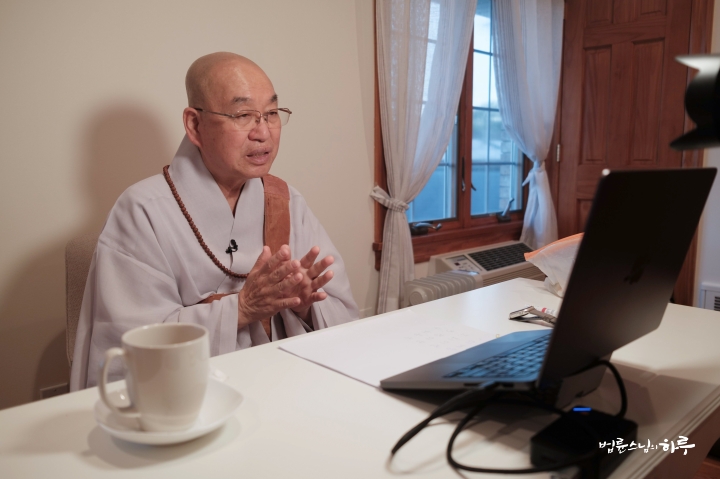
“I am currently in New York, USA. The time here is 6:30 AM. I arrived at the New York airport around 10 PM last night and got to my accommodation after 11 PM. That’s why I’m meeting with you all so early this morning to have this conversation. For the next two weeks, I’ll be in the eastern United States, traveling to ten locations from Toronto, Canada in the north to Houston in the south, having conversations about life and the world with Korean expatriates and local Americans through interpretation. Today, let’s have a conversation online with those of you in Korea.
The UN General Assembly is currently being held here in New York. I’ll be giving a lecture in Manhattan tomorrow, but due to the UN General Assembly, traffic congestion is severe, so I was told to take the subway instead of a car. The US is also experiencing various political turmoil and conflicts. The Korean government seems to be deeply concerned about how to establish relations with the US due to America’s tariff policies. Even in such a chaotic world, we must maintain peace of mind and live each day. If I become chaotic just because the world is chaotic, I’m the only one who loses. Moreover, it doesn’t help at all in making the chaotic world peaceful. Regardless of how the world is, we must first maintain our composure. Then, if we take the perspective of how we can contribute to making the world peaceful, we can make even a small contribution.”
Sunim then had conversations with four people who had submitted questions in advance. One of them shared her concerns about feeling even more lonely and empty despite living with her husband.
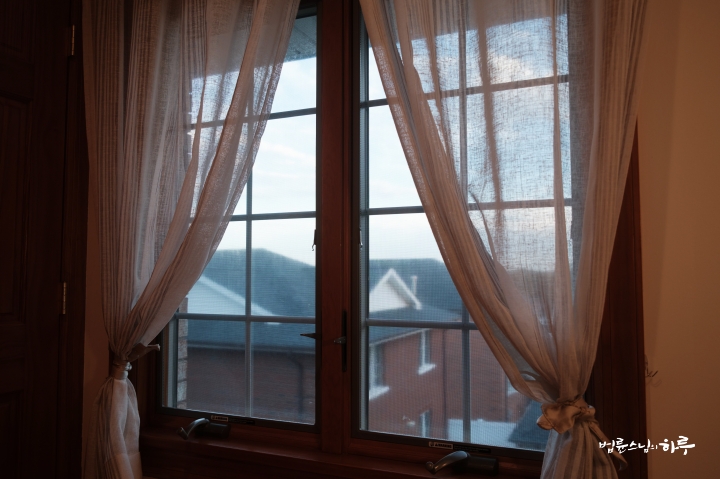
I Feel So Lonely Living with My Husband. Should I End This Marriage?
“First, you need to examine whether your husband goes out because it’s really necessary for his business, or because he finds it suffocating when you keep questioning and interrogating him. From your husband’s perspective, if conversations never end and always turn into arguments, like gum stuck to one hand then the other, he might not want to talk. If he dislikes talking with you and that’s why he drinks with friends outside and comes home at midnight only to leave in the morning, you should first get counseling to examine yourself.
While having no interest in your husband is a problem, having too strong an attachment that suffocates your husband can also make him feel trapped. Even when living together, both hearts need some freedom. Instead of constantly raising objections to your husband, if you’re seriously considering divorce because it’s that difficult, try having a comfortable cup of tea with your husband and express your loneliness.
‘Honey, I have no other complaints about you. I feel very lonely because you come home late and we can’t spend time together. Of course, you might feel a bit suffocated being with me, but since I’m having such a hard time, could you help me a little?’
Try talking to your husband like this. Don’t raise it as a problem saying ‘You going out is the problem,’ but talk about your loneliness and ask for help. You also need to listen to what your husband has to say. While listening only to the wife’s story makes the husband seem too indifferent, listening to the husband’s story might reveal that he doesn’t want to come home because his wife is too clingy and suffocating. So first, you need to have a conversation with your husband. Of course, due to preconceptions about each other, even if you start the conversation with good intentions, it might eventually turn into an argument where you can’t control your emotions and have to stop talking. If there were no children, you could consider living separately, but since you have children, it would be good to do your best to have a conversation.
Don’t make demands of your husband, but express your difficulties to him the way you’re talking to me. However, your husband might not want to hear even this. He might say ‘Not this again!’ and leave, but even so, you need to try two or three times. Put your pride aside. Instead, try saying something like ‘Honey, I’m having a hard time right now, please help me.’ And you need to understand what your husband’s difficulties are, why he’s wandering outside, and identify the cause.
But if your husband is truly busy with lots of work and wandering outside because it’s necessary for business, you need to be understanding even if you’re lonely. Because if your husband is really working devotedly for the children and family, but his wife keeps comparing and questioning ‘Is work more important or am I more important?’ it becomes irritating.

So first, express your difficulties. You shouldn’t just try once – you need to try two, three, or four times. Appeal step by step, and if it absolutely doesn’t work, then as a last resort, since you also need to live happily, divorce is an option. Since you already have children, you shouldn’t jump straight to divorce. Also, you need to consider getting psychological therapy first. Start by going to a psychiatrist for counseling and self-examination. If necessary, try attending the Happiness School, Jungto Dharma School, or the Awakening Retreat. Instead of blaming your husband, you need to first examine and address your own psychological state.
Second, if after this self-examination you determine that married life is truly impossible, then it’s okay to separate. However, if you divorce without proper self-examination, you will definitely regret it later. There are issues with the children, living expenses, and it could be a problem caused by your constant nagging of your husband. So first do a self-examination, and then express your difficulties to your husband.
‘Honey, I’m having some difficulties. I’d like you to listen to my troubles and give me your assessment. I want to know if I’m having completely unnecessary thoughts, or if you could spare some time to help me – please check with me.’
Don’t be too pitiful, don’t be too argumentative – there’s a way to appeal like this. I think it would be good to overcome this through such methods. There are countless cases where situations like this have been overcome. While I understand your frustration, I want to tell you that this is something that can definitely be overcome.”
“Actually, I’ve already tried everything Sunim suggested.”
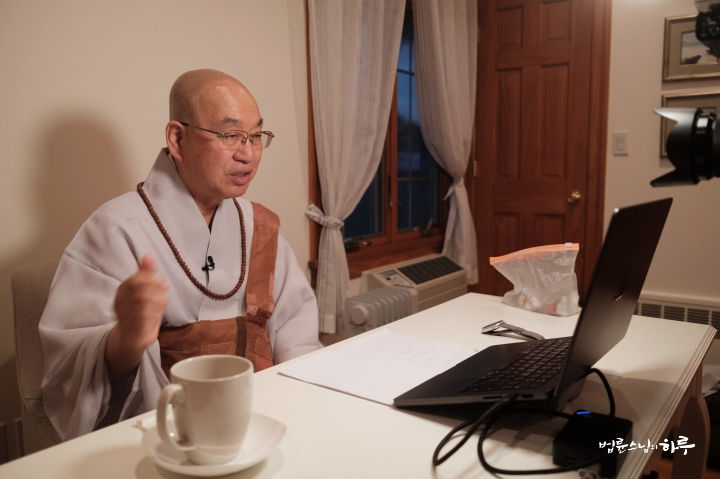
“How did you try? Did you talk with your husband?”
“I was curious why my husband acts this way, so I talked to him. He said it’s not that he dislikes me, and it’s not that work is hard – he just really loves his work and really enjoys being with his friends.”
“Then why don’t you ask if you could go along when your husband hangs out with his friends?”
“I’ve tried that a few times too, but we’re so different that it was difficult. I found it hard to get along with my husband’s friends. I’m the only woman, and they’re all single. Since I have children, it’s too hard to go out like that every time.”
“You don’t have to go every time – just go occasionally. Just go sometimes when you feel lonely! Have you been to the Awakening Retreat?”
“Not yet.”
“Then let’s talk after you attend the Awakening Retreat first. Most people feel much better after attending the Awakening Retreat. Have you graduated from Jungto Dharma School?”
“No.”
“You haven’t tried anything, so why do you say you’ve tried everything?”
“If you practice some mind training, there’s an 80-90% chance this problem will be resolved.”
“Thank you. I’ll give it a try.”
Questions continued one after another. After about an hour of dialogue, Sunim gave his closing remarks.
“The questions you asked today are about things that everyone experiences in life. When you bring them out and examine them one by one, they’re actually not a big deal. So don’t hold back – bring them out and examine them. Then you’ll realize they’re not a big deal. That way, you won’t feel stressed. You feel stressed because you’re holding it in.”
After finishing the live broadcast, it was past 8 AM. After having breakfast and checking the day’s schedule, Sunim took a rest.
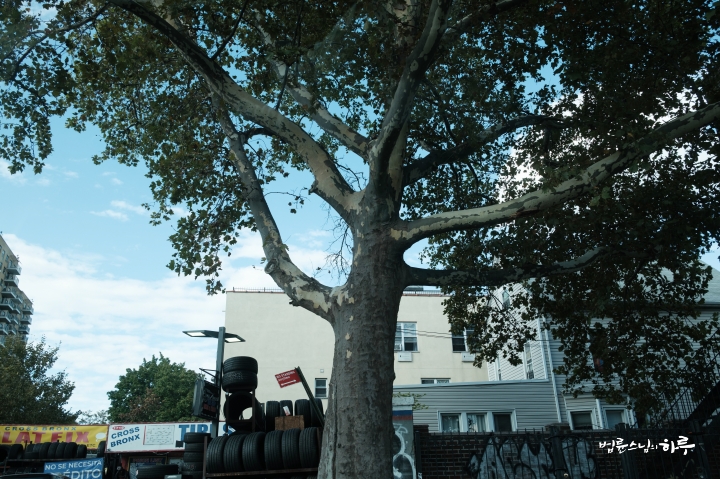
After lunch, Lee Yeon-soon, Choi Kyung-sook, and Lee Myung-sook, who were early board members of New York Jungto Society, came to the accommodation to greet Sunim. The three offered three prostrations to Sunim and then had a conversation together.
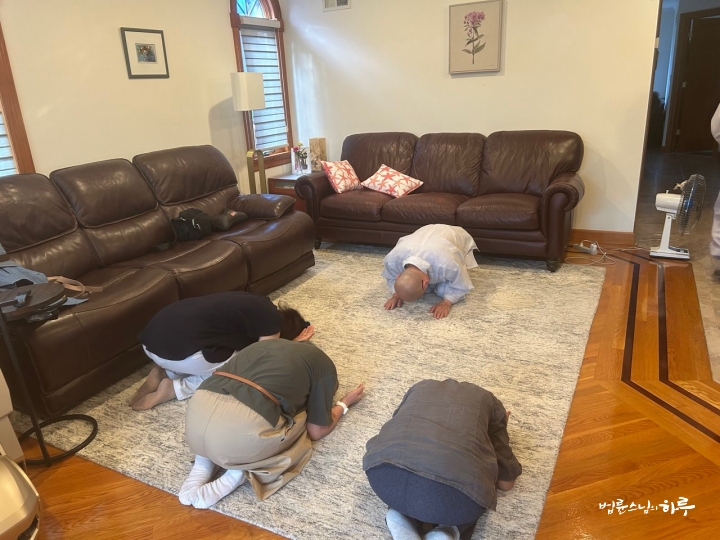
They reminisced about the days when there was no Dharma center, carrying Dharma assembly supplies in bundles like peddlers to hold meetings, and the times when they had to move from place to place with everything from cushions to all supplies for the Awakening Retreat. Now, as grandmothers with graying hair, they laughed while sharing stories of the past. They took a photo together to commemorate their long-awaited reunion.
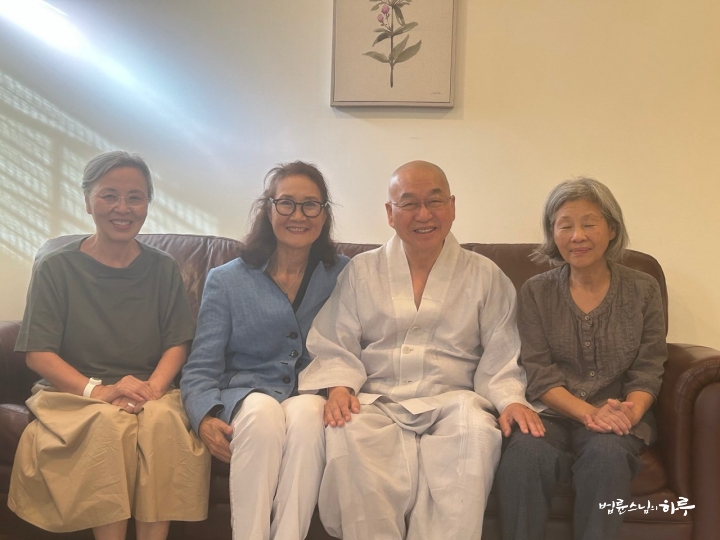
At 4:30 PM, Sunim departed for the lecture venue. Today’s lecture was held at the Korean Community Center (KCC) located in Tenafly, New Jersey, on the east side of the Hudson River. New Jersey is an area where many Korean expatriates live, including those on assignment from Korea.
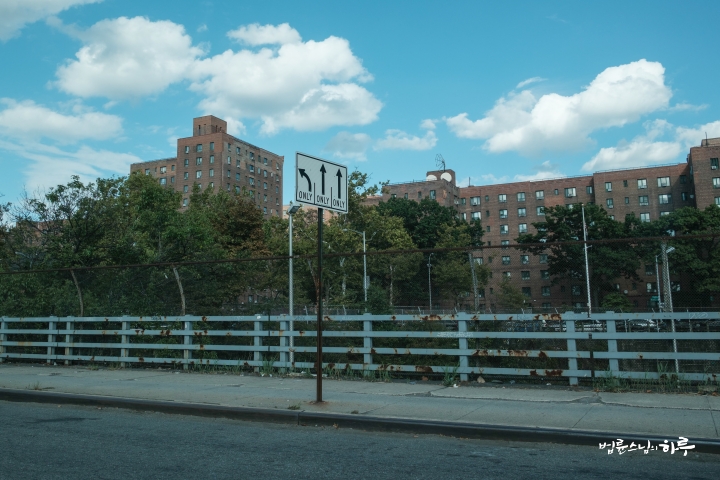
Although it’s normally an hour’s drive from the accommodation, due to Friday rush hour traffic, it took over two hours to arrive at 6:45 PM, just 15 minutes before the lecture was scheduled to begin.
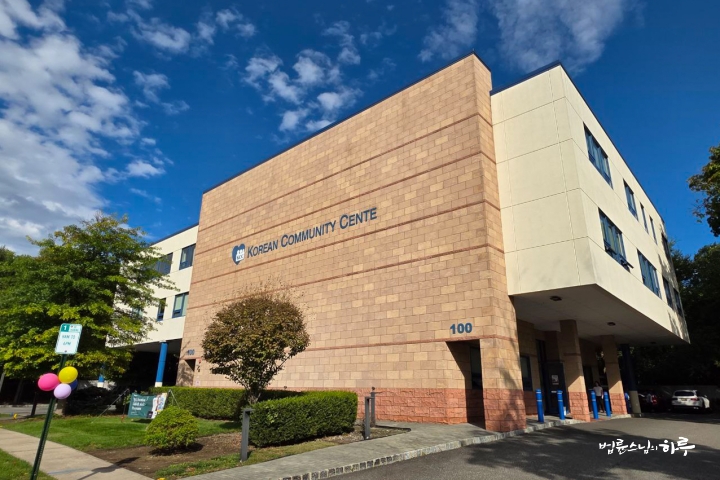
As they entered the lecture venue parking lot, many volunteers warmly welcomed Sunim. When the volunteers worried that attendance might be low due to traffic, Sunim reassured them that it would be fine.
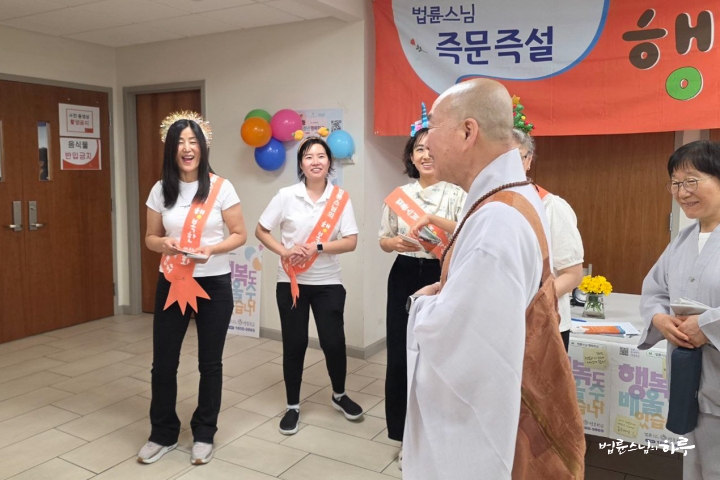
Going up to the third-floor lecture hall, the room was bustling with volunteers and participants, creating a festive atmosphere. Among the volunteers was someone who had volunteered at a Dharma Q&A lecture in St. Louis 11 years ago.
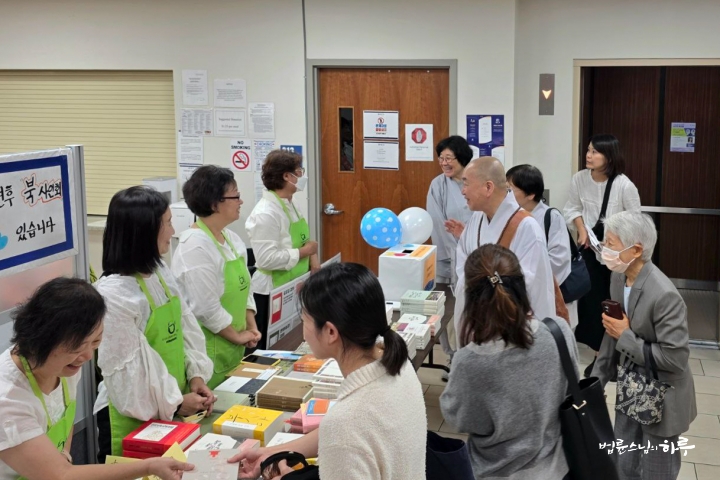
At 7 PM, after the introduction video ended, Sunim took the stage. Sunim greeted everyone with a smile.
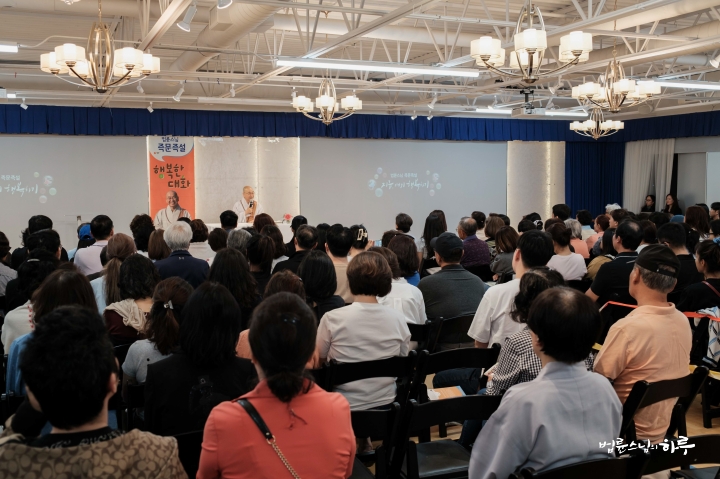
“Was traffic heavy on your way here?”
“Yes.”
“I came from Queens, New York, and it took a little over two hours. People told me I should leave two hours early, and I joked that I could get to Washington D.C. in that time. But it really did take just over two hours. So I thought participants might also be quite late due to traffic. But fortunately, everyone arrived on time. Do you all live in New Jersey?”
“Yes.”
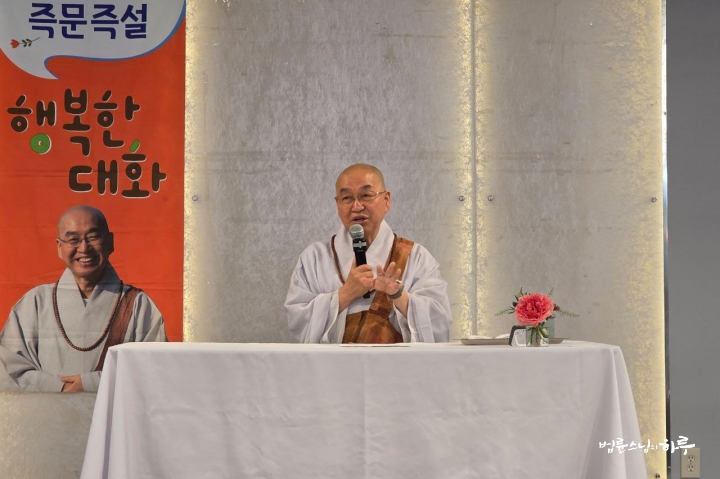
“From today’s perspective, my way of having conversations with people through Dharma Q&A might seem like Venerable Pomnyun’s unique teaching method. But historically, it’s quite similar to the way things were when the Buddha was alive. The Buddha conversed according to people’s needs and requirements; he didn’t give one-sided lectures to people. Looking at other Buddhist history, you could say it’s similar to ‘Yadan Beopseok’ (Grand Open-air Dharma Talks). You’ve heard of Town Hall Meetings that Americans use these days, right? You can think of Dharma Q&A as you and I having a free conversation like a Town Hall Meeting.”
After briefly explaining how Dharma Q&A works, Sunim took questions. Over two hours, six people were able to have conversations with Sunim. One of them sought Sunim’s advice, saying that although she had wanted to raise her children well and pursue new work after coming to America, things weren’t going as expected.
I Lived Well in Korea, but Why Is It So Hard in America?
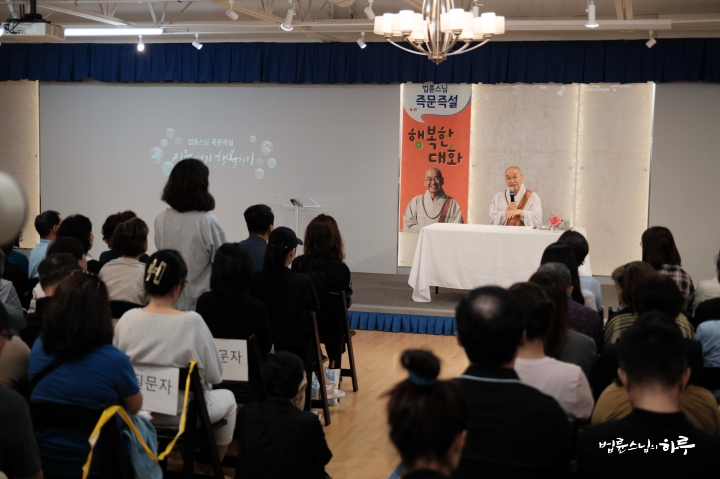
“Your question seems unfocused. I roughly understand what you’re trying to say. It seems you’re having difficulty adapting after moving from Korea to America, and raising children is challenging. But asking what to do with 10 million won is too vague a question. You could use it for living expenses or your child’s education – that’s for you to decide.
When you leave your homeland and immigrate, difficulties naturally arise. Still, I can mention three conditions that increase the chances of success. First, when workers from poor countries earning low wages immigrate to wealthy countries like America. For example, 40 years ago, manual laborers in Korea earned $10 a day. But if they immigrated to America and did the same work, they could earn $100 a day. Whether they worked in construction or as restaurant servers, doing the same job would increase their income tenfold. Such people have a high chance of adapting well to immigration. How well they speak the language isn’t important. People in these conditions mostly settle and live well even without English, communicating through gestures.
Second is when people come as students and put down roots in the immigrant society. Whether Koreans go to America or Vietnamese come to Korea, if they attend school first and put down roots there, their chances of success after immigration are very high. By attending school, they can learn the language and make friends. They can also obtain certifications recognized in that country. People who attend school first before entering society adapt very easily to that society.
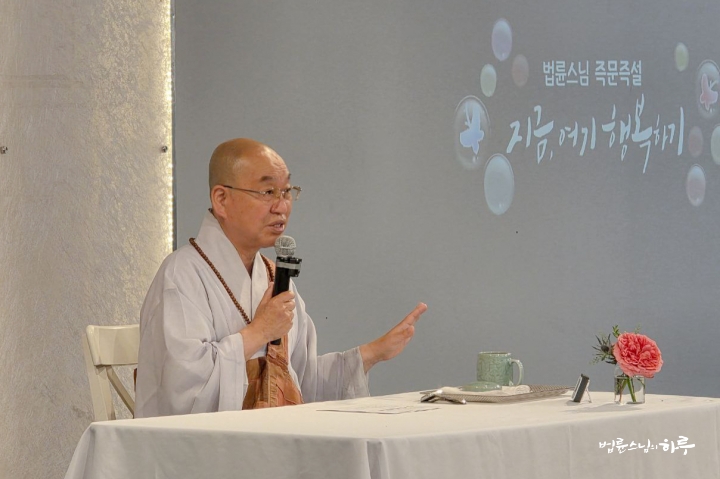
The third case is when people immigrate with a lot of money. For example, when coming from Korea to the United States, they bring about one or two million dollars. With that money, they can acquire a well-established business outright. This approach also has a high probability of successful immigration. They can continue operating with the existing local employees. While there’s still a possibility of failure, this is also a relatively easy path to success.
However, if someone comes to America without much money, hasn’t adapted to American society through studying here, and doesn’t have the mindset to do low-wage work in American society, I can say it will be difficult for them to adapt and live here. People like you who graduated from university in Korea, worked at a company, and then immigrated after marriage with just some technical skills will inevitably face difficulties. For example, when people immigrate from Vietnam to Korea, even if they graduated from Vietnam’s most prestigious university or from law or engineering schools, Korean society doesn’t recognize their educational credentials, so they have no choice but to start with manual labor. Within Vietnamese society, there would be a tremendous difference in treatment in the job market between someone who only graduated from middle school and a highly educated person from a prestigious university. However, in the Korean social environment, the person who only graduated from middle school adapts much faster. When highly educated Vietnamese come to Korea, they don’t receive the same recognition for their education as they would in Vietnamese society, so in the Korean job market, there’s not much difference between them and someone who only graduated from middle school. Most likely, they’ll be hired as factory workers. But they tend to think, ‘If I had stayed in Vietnam, I wouldn’t be doing this kind of work,’ and still have attachments to office work even after coming to Korea. That’s why most of these people fail to adapt to immigrant life and return to their home country.
Most early Korean immigrants to America were ordinary working-class people. So when they came to America, they could do any kind of work. Even if they opened small shops, most settled down and lived well. But looking at recent immigrants, many have graduated from university. Most of these people have difficulty finding their place. Except for those with highly specialized skills like doctors, most suffer greatly emotionally. In Korea, they graduated from university and worked at companies utilizing their majors to some extent, but when they come to America, they clearly feel how difficult it is for immigrants to find employment under such conditions. So most end up doing work in America that university graduates wouldn’t do in Korea. In that process, their self-esteem takes a significant hit.
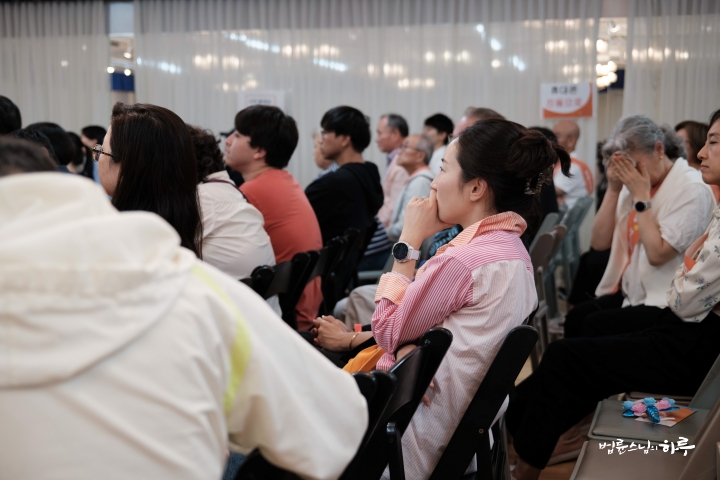
It doesn’t seem like you have favorable conditions for adapting to American society as an immigrant. So first, I suggest you return to Korea as soon as possible. If living in America doesn’t make you think “This is a nice place to live” but rather “It’s harder to live here than in Korea,” it proves that you were living reasonably well in Korea. Someone who lived in a very poor environment couldn’t possibly say life is difficult when coming to a country like America. Adapting to immigrant society has nothing to do with local language skills. People from poor environments who come to America earn more than 10 times what they made in their home country, regardless of what work they do. So they can’t possibly say life is difficult. The reason you keep feeling nostalgic about life in your homeland while living in America is because you lived quite well in Korea. That’s why American life is inevitably difficult for you.
If you want to settle in America, you shouldn’t keep comparing it to life in Korea. Even if you don’t speak English, you need to live with a proactive attitude in everything. In my case, since I don’t intend to live in America, I don’t end up learning English. But if you’re going to live in America, you absolutely must learn English. Of course, I also thought about spreading Buddha’s teachings in America 30 years ago. I thought that to spread the Dharma globally, I should mainly work in America rather than Korea. To do that, I first needed to speak English as fluently as a native speaker. What’s the best way to learn English? Going to university isn’t the best method. The best way is to go somewhere with absolutely no Koreans and marry an American. If you marry an American and live together for just five years, you’ll become fluent. To do Dharma Q&A, I need to grasp subtle emotions from the other person’s expressions and voice. Without that, if you communicate through an interpreter, mostly just the meaning of words goes back and forth, making it difficult to have deep communication with the other person. Just like a balloon gradually expands and suddenly pops when you keep blowing it up, when learning a foreign language, psychological pressure builds up and at some point suddenly breaks through, opening up your ability to speak. But if you keep using Korean because it’s frustrating in the middle, it’s hard to improve your skills. However, if I were to do that, there would inevitably be restrictions on my activities as a monk. So after hesitating, I ultimately couldn’t make that choice.
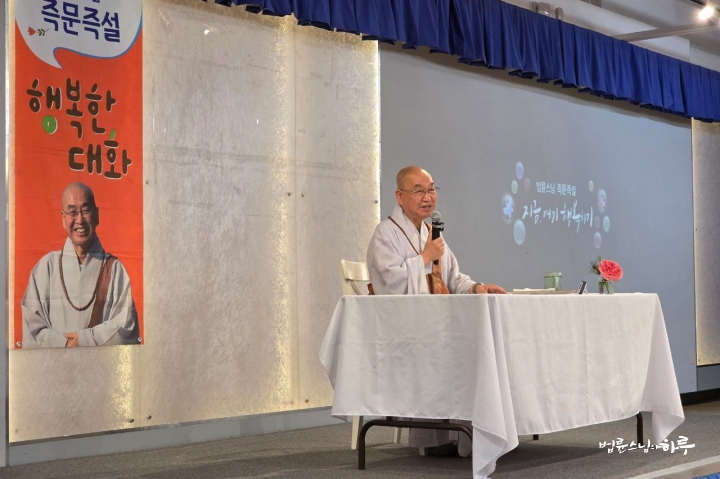
Just like that, if you want to settle down and live in America, you need to let go of the idea of returning to Korea. You shouldn’t think, ‘Life was good when I lived in Korea, but these things are difficult here.’ You need to live with the mindset of ‘Since I came to America, I will unconditionally live here.’ Only then will a path open up. If you keep having lingering attachments to life in Korea, it would be better to return quickly. It’s just a waste of time. Nevertheless, your experience of living in America won’t become completely useless even if you return to Korea. Even a brief experience of living in America can become a valuable asset for living in Korea. Instead of thinking ‘My life is a failure because I returned to Korea due to the hardships of immigrant life in America,’ you should think ‘I have also lived in America.’ Then it will be helpful even when you return to live in Korea. You should think, ‘I tried hard to settle down even in unfamiliar America where I couldn’t communicate well, so I can certainly live well in Korea. There’s nothing difficult about it.’ This way, you can live better when you return to Korea.
So you need to either return to Korea quickly or completely cut off your lingering attachments to Korea and live here. If you focus and live like that, you’ll adapt at some point. If you continue living half-heartedly with one foot in each place like now, it will become increasingly difficult to adapt.”
“Thank you. I understand well.”
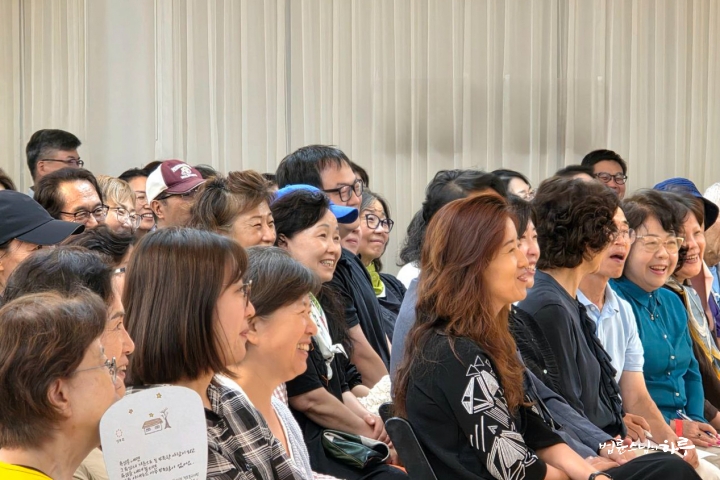
Questions continued to follow.
I’m having conflicts with my Chinese husband who wants us to move to China together after marriage. What should I do?
I don’t have a good relationship with my 24-year-old working daughter whom I raised with care. I also had an uncomfortable relationship with my mother when I was young, and similar situations seem to be repeating. What should I do?
My brother-in-law had his ex-wife buried with my father without my knowledge. I am now trying to move my father’s casket, but my brother-in-law is strongly against it. I recently reunited with my father who divorced when I was young. Seeing that he remarried and lived well makes me feel uncomfortable.
I injured my toe, so doing 108 prostrations is difficult. What practice can I do instead of 108 prostrations?
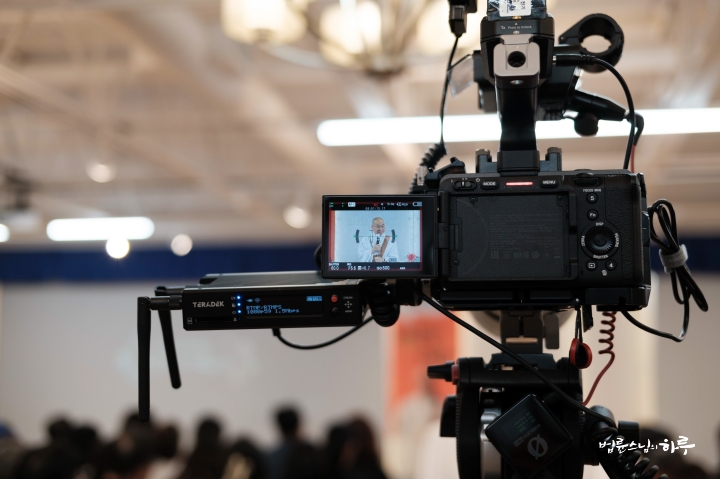
There were more questioners, but two hours had already passed since the lecture began, so Sunim regrettably gave his closing remarks.
“Today’s Dharma Q&A ended with just talking about life stories. American society is quite chaotic these days, but none of you living in America asked questions about American society. There have been many political changes in Korea too, but it seems you don’t have much interest in that either. Living in America, perhaps you’ve become like President Trump and have no interest in the climate crisis either. (Laughter)
I see someone just raised their hand, but we’ve already exceeded our scheduled time, so we’ll stop here for today. I wish you all happiness.”
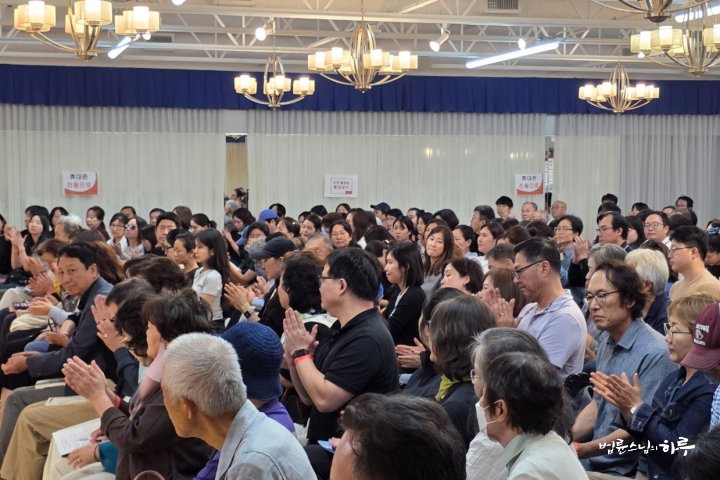
The lecture ended with loud applause.
After the lecture, a book signing session was held in front of the stage. There were also foreign participants. Sunim informed them that tomorrow’s lecture in Manhattan would be conducted with English interpretation.
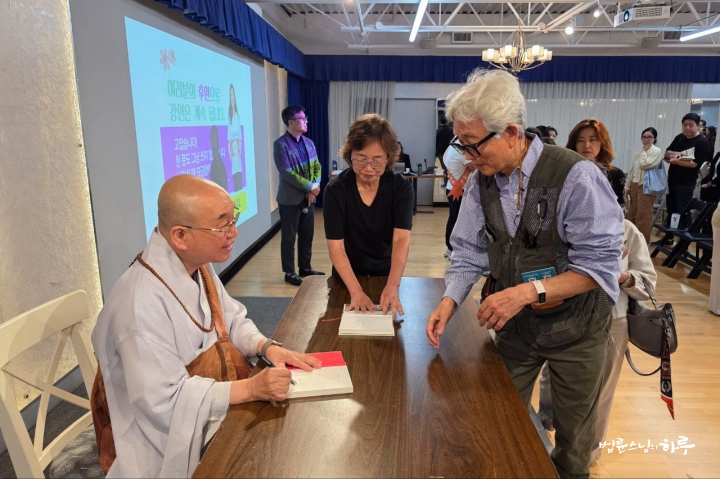
Many people who received autographs expressed their gratitude, saying “Thank you for coming such a long way” and “I’m so grateful to be able to listen to your lectures on YouTube.”
After the signing session, Sunim took a group photo with the volunteers.
“New Jersey, fighting!”
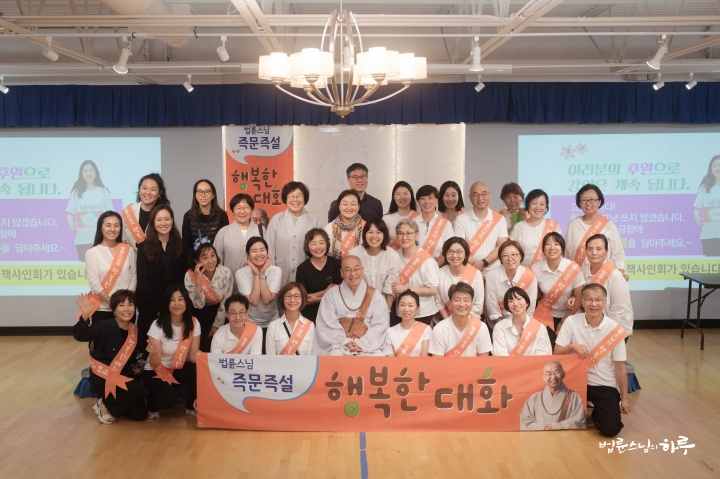
After the photo session, Sunim presented his books as gifts to Lee Seon-rim, who was in charge of today’s lecture, and Jang Gyeong-ji, the deputy coordinator, as a token of appreciation.
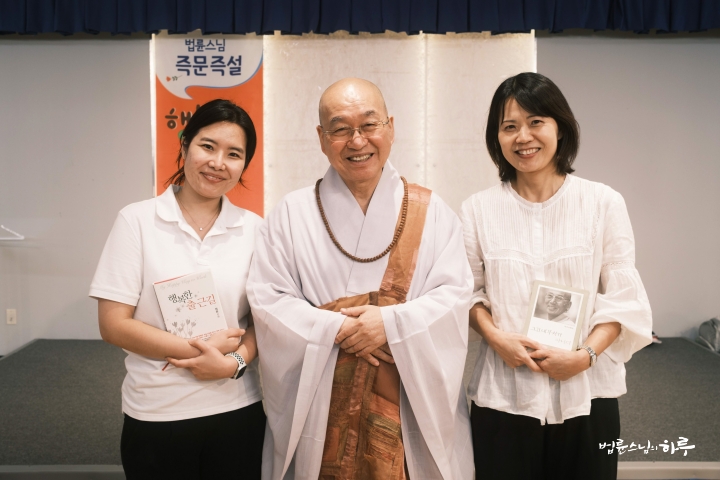
After finishing the cleanup, the volunteers had a mindful sharing session with Dharma Teachers Myodeok and Beophae. Not only members from overseas branches but also members from the Happiness Division and International Division came from far away to help prepare for the lecture.
“Through this volunteer work, I gained a deep understanding of how YouTube videos are made. Sunim draws people together in a mosaic that reflects the character of the Buddha.”
“I will volunteer at tomorrow’s New York lecture too.”
Sunim said goodbye with “See you at tomorrow’s New York lecture” and departed for his accommodation first. The return journey had much smoother traffic than the way there, and he arrived at the accommodation around 10:20 PM.
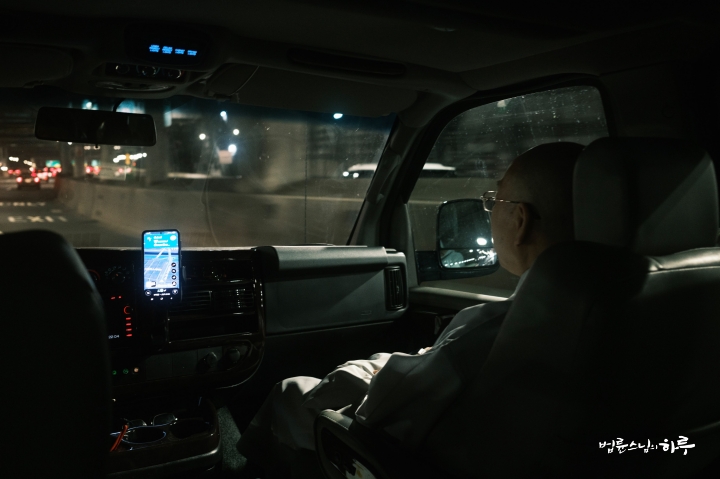
Tomorrow, Sunim will conduct the Jungto Dharma School entrance ceremony online at 1 AM, give a Dharma Q&A lecture for Korean residents in New York at 2 PM, and hold an English-interpreted Dharma Q&A lecture in Manhattan at 7 PM.





